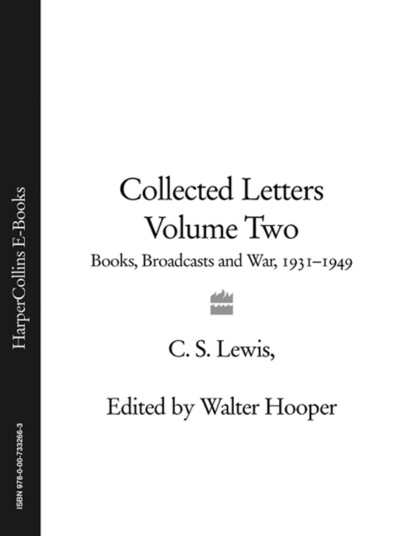Yours,
Jack
TO EUGÈNE VINAVER (W):
(#ulink_6894c5cd-417e-56e6-9af2-fb89d5240d6f)
Magdalen College,
Oxford.
Sept 19th. 1935
Dear Vinaver
Thank you very much for the copy of your lecture.
(#ulink_9a34d32e-bbfd-54f0-a316-9aaaae74428c) Ever since I heard it at the Arthurian
(#ulink_14437239-210d-519f-9aa1-4a6e75afbe92) I have wished for more of it than memory could carry—as it is now a sine quâ non for any reading of Malory.
About holes in VI vi, it may interest you to note that my own MS. note on the passage gives ‘Hole = fenestra’ (Catholicon Anglicum 1483)
(#ulink_6367092d-8e4f-554d-946f-345a92a16da7)-a reference I probably got from the N. E. D.
(#ulink_d0780b21-b99b-579a-8079-44fee25722b4) But can you throw any light on ‘hole of the tree’ in VI ii? Your knowledge of ‘F’ will enable you to say at once whether this is merely an error for ‘bole’, or whether we must consider further. (Tolkien showed me O. E. Health = angulus > fork (of a tree) but this is difficult phonologically.)
Thanks also for your very kind reference in a footnote to my somewhat pert review.
(#ulink_8bca59de-0777-5576-abf9-42c285699cb4)
I do wish you could see your way to give us a commentary as well as a text when you bring out the W. MS.—it is badly needed for all aspects of the work and whose business is it if not yours?
With many thanks.
Yours
C. S. Lewis
In the winter of 1935 the Delegates of the Oxford University Press conceived the idea of the Oxford History of English Literature, and in March 1935 they appointed as general editors the distinguished scholars, F. P. Wilson
(#ulink_e4d64cbe-95b2-5c10-ad88-040a8f49bb3c) and Bonamy Dobrée.
(#ulink_58d2d6ce-5a3b-5d7d-9ba1-cc1d4851c1b5) They were to work in close co-operation with Kenneth Sham (1887–1971), who was assistant secretary to the Delegates of the Oxford University Press at this time.
In October 1935 the Press announced that it had undertaken the production of this daunting task, which was to consist of twelve volumes, each volume the work of a single author. While each volume would, in the main, begin and end at a definite date, there would have to be a certain degree of dovetailing and authors were expected to consult with those writing the volumes on either side of them so as to avoid overlapping.
Shortly before making this announcement, F. P. Wilson wrote to Lewis, explaining who had been invited to write which volume, and asking if he would write the one on the sixteenth century.
(#ulink_e9ee2074-ca02-5d0f-89be-6852dbf143e8) There followed this reply from Lewis:
TO FRANK PERCY WILSON (OUP):
Magdalen College,
Sept. 23rd 1935
My dear Wilson
Really, really! In other words you have missed the chance of Tolkien on O.E.
(#ulink_9dd044ad-0579-5b4b-844d-07850f46e5b8) and R. W. Chambers
(#ulink_8237a3e6-6a6e-5c42-839c-15ff137f5e61) on the XVIth century. For heaven’s sake, if it is still possible, do that, and either check me out or give me the XVth.
The Allegory book is done and I am now in communication with Sisam about it.
But, really–
Yours ever
C. S. Lewis
No answer, forsooth! Marry, come up!
(#ulink_a6e7421d-25c3-5c84-81a8-70f6805f5414)
The planning of the Oxford History of English Literature—‘O Hell!’ as Lewis called it—continued. The task of writing a volume in this series was so onerous that a number of those who originally agreed to write for the series either opted out of the programme or died before the work was done. F. P. Wilson continued firm in his belief that the sixteenth-century volume was right for Lewis, and Lewis agreed to write it. However, Lewis did not want to include drama in his work, and Wilson agreed to write a separate volume entitled English Drama 1485–1585 (1969).
TO ARTHUR GREEVES (W):
[The Kilns]
Dec 7th 1935
My dear Arthur,
I am sorry you have had to haul this letter out of me by the scruff of its neck. It’s not that I have nothing to say to you and don’t want to hear what you have to say. I believe I could still make a fair attempt at a regular correspondence, but you yourself vetoed that, and odd letters, like odd bills, I do find it hard to meet when I’m busy.
Minto told you about our present bother. The guests are still here, and will be, so far as I can see, until the end of January.
(#ulink_1fa357af-9150-5afe-969d-3a391e3cdbad) Oh Arthur, what a snag it is that the people who are pitiable are not necessarily likeable. Molly Askins is emphatically one of those people of whom old Foord-Kelsie said ‘We must learn to love those whom we can’t like.’ She’s what you would call an encroaching person—do you know the type of small, dark woman with big gentle eyes and soft voice, who just gently and softly and even pathetically gets her own way in everything and really treats the house as a hotel? However, the thing’s a duty and there’s an end of it: tho’, by the bye, as W. and I were saving the other day, the New Testament tells us to visit the widows, not to let them visit us!
(#ulink_34751fb2-b04c-5f49-b465-9c3713c0b18a)
I have finished my book, which is called The Allegorical Love Poem, and is dedicated to Barfield. The Clarendon Press have accepted it and hope to have it out by May.
(#ulink_c0ed27b0-ba28-5f01-923e-30dd89138b68) As I am to get 12 free copies (Dents only give one 6) you and Tchanie shall each have one and save your silver: and whatever you think of the matter, I hope, from experience of the Clarendon Press, that binding, paper etc will be-in our old formula—excellent, exquisite, and admirable. In other words, if you can’t read it, you will enjoy looking at it, smelling it, and stroking it. If not a good book, it will be a good pet! It will be about 400 pp, they say. (It will be very funny, after this, if they do it in double columns and a paper cover.)








 Рейтинг:
0
Рейтинг:
0